You are viewing the Cultures of Knowledge Blog archive for the ‘Conferences and Workshops’ Category:
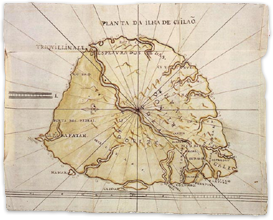 Further to the spatial excitements of our own recent gathering, a one-day conference on Imaginative Geographies: Travels of the Mind in Early Modern Europe will take place at the University of Bristol on Wednesday 28 September 2011. According to the organisers, the event will ‘explore correspondences between geography [and] literary and historical fields of research, to enable varied… cross-disciplinary discourses between scholars and students of the arts and sciences, and to enrich renaissance and early modern research with methodological and thematic diversity’. Panels are devoted to spiritual geographies, cartographic spaces, mapping the other, and mapping the familiar. For the full programme and to sign up please visit the conference website.
Further to the spatial excitements of our own recent gathering, a one-day conference on Imaginative Geographies: Travels of the Mind in Early Modern Europe will take place at the University of Bristol on Wednesday 28 September 2011. According to the organisers, the event will ‘explore correspondences between geography [and] literary and historical fields of research, to enable varied… cross-disciplinary discourses between scholars and students of the arts and sciences, and to enrich renaissance and early modern research with methodological and thematic diversity’. Panels are devoted to spiritual geographies, cartographic spaces, mapping the other, and mapping the familiar. For the full programme and to sign up please visit the conference website.
James Brown
September 12, 2011
Conferences and Workshops, Events, Project Updates, Projects and Centres, Websites and Databases
Tags: CKCC, Eighteenth Century, Geography, Mapping the Republic of Letters, Networks, Seventeenth Century, Spatial Theory, The French Book Trade in Enlightenment Europe
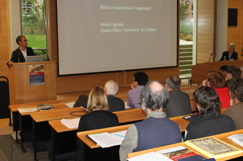
Miles Ogborn’s keynote.
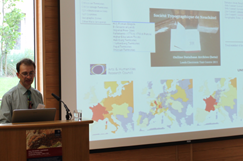
Simon Burrows from the FBTIEE project.
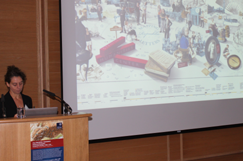
Giovanna Ceserani’s keynote.
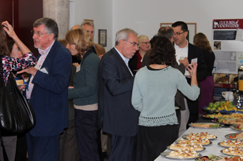
Discussions continue over lunch.
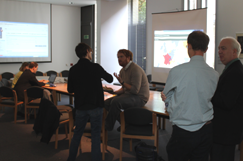
Testing the demonstrators.
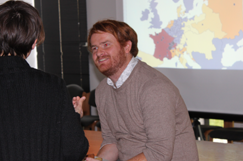
Mark Curran from the FBTIEE project.
The Project’s second international conference, International Geography: Comparative Studies, 1550-1700, took place at St Anne’s College last week on 5–7 September 2011. The event, which was attended by over sixty delegates, allowed twenty-seven emerging and established scholars to present conceptual papers and rich case studies – from Europe and the wider world – which both explored the organization of early modern intellectual activity across time and space, and attempted to implement and refine the concept of ‘intellectual geography’ as a new means of understanding and appreciating the spatial dimensions of intellectual exchange. On the final day, papers from several digital projects – including our good friends from CKCC (Huygens ING) and Mapping the Republic of Letters (Stanford) and new friends from The French Book Trade in Enlightenment Europe (Leeds) – shared some of the opportunities and challenges of capturing and visualizing intellectual geography electronically. Delegates were also treated to a drinks reception in the historic Museum of the History of Science (which incorporated a talk and tour of the intellectual geography of scientific objects), and enjoyed playing with software prototypes of the enormously impressive database of the STN archives prepared by the FBTIEE project, as well as of our own union catalogue of intellectual correspondence. Conference reports, videos, and other outputs will be available soon; in the meantime, for further information, including speaker profiles and abstracts, please visit the conference microsite. Details of our 2012 conference will be available soon.
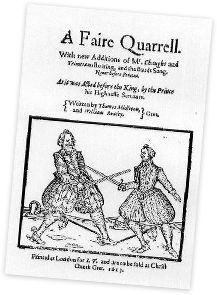 The Electronic Enlightenment Project is currently seeking paper proposals for its second colloquium on the sociology of the letter, Epistolary Quarrels: Matter and Manner (Oxford, 19 November 2011). The colloquium provides a forum for both academics and graduate students exploring correspondence in the early modern period. The papers given by academics will be forty minutes; those given by graduate students will be twenty minutes. Conference papers can be in English or French. A selection of papers will be published electronically in the Electronic Enlightenment Project’s Letterbook. The deadline for 250-word abstracts is Friday 9 September 2011. For further details and how to submit, visit the colloquium webpage.
The Electronic Enlightenment Project is currently seeking paper proposals for its second colloquium on the sociology of the letter, Epistolary Quarrels: Matter and Manner (Oxford, 19 November 2011). The colloquium provides a forum for both academics and graduate students exploring correspondence in the early modern period. The papers given by academics will be forty minutes; those given by graduate students will be twenty minutes. Conference papers can be in English or French. A selection of papers will be published electronically in the Electronic Enlightenment Project’s Letterbook. The deadline for 250-word abstracts is Friday 9 September 2011. For further details and how to submit, visit the colloquium webpage.
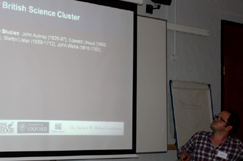
James introduces the Project.
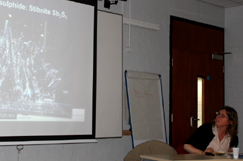
Anna Marie describes stibnite.
The Project was on the road again this week, this time at the venerable Reading Conference in Early Modern Studies, which this year took as its theme ‘Communication and Exchange’ (University of Reading, 18−20 July 2011). On Monday afternoon, a panel devoted to CofK comprised three interlocking papers. Project Coordinator James Brown provided an overview of the Project and its intellectual objectives, Research Fellow Anna Marie Roos delivered a wonderful case study of Martin Lister‘s hitherto unsung contributions to Newtonian telescopy, while Editor Kim McLean Fiander introduced our union catalogue of early modern correspondence and treated delegates to a sneak preview of its editorial and search interfaces. In the evening, Project Director Howard Hotson concluded our contribution with a plenary address on the multi-layered network of Samuel Hartlib. In a wide-ranging analysis, Howard recapitulated some of the broader objectives of the Project, before describing the way in which Hartlib’s legendary intelligencing both superimposed and reflected the pedagogical, diplomatic, commercial, and military networks engendered by the upheavals of the Thirty Years War. For more information about the conference, please download the programme (pdf).
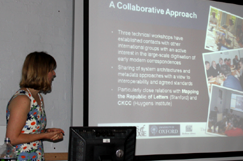
Kim introduces the catalogue.
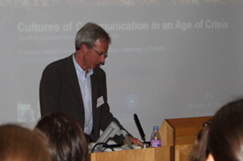
Howard's keynote on Hartlib.
Update: Preview some preliminary results
We are fortunate to have with us this week Scott Weingart, a former student of Robert A. Hatch and an up-and-coming visualization expert from Indiana University‘s Cyberinfrastructure for Network Science Center. Following on from a workshop at Mapping the Republic of Letters (Stanford) and a three-month stint at CKCC (Huygens Institute), Scott will be spending time with our union catalogue development team at BDLSS, raising awareness of the various techniques and technologies available for representing and visualizing large epistolary datasets. Scott kicked off his stay with a well-attended presentation on ‘Analyzing, Visualizing, and Navigating the Republic of Letters’ on Monday 11 July. In a two-part discussion, Scott provided a general introduction to the many uses and histories of visualizations, before describing in detail the various software packages and data formats necessary for implementation. Both of Scott’s talks can be watched again below; you can also ‘click along’ with his slides.
Part I: Introduction
Part II: Implementation
James Brown
July 13, 2011
Conferences and Workshops, Events, Project Updates
Tags: Databases, Digitization, Europe, Geography, Global, Networks, Spatial Theory, Visualization
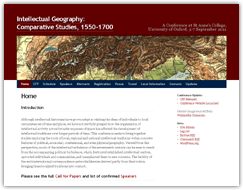
We are pleased to announce that booking is now open for Intellectual Geography: Comparative Studies, 1550-1700, the second Project conference, which will take place at St Anne’s College, Oxford, on 5-7 September 2010. Organised by Howard Hotson, the event brings together case studies and digital projects exploring the roots of local, regional, and national intellectual traditions and networks within concrete features of political, economic, confessional, and physical geography. For provisional programme information, a steadily growing lists of speaker profiles and abstracts, and to book online, please visit the conference website. The deadline for registrations is Wednesay 31 August.
 Further to the spatial excitements of our own recent gathering, a one-day conference on Imaginative Geographies: Travels of the Mind in Early Modern Europe will take place at the University of Bristol on Wednesday 28 September 2011. According to the organisers, the event will ‘explore correspondences between geography [and] literary and historical fields of research, to enable varied… cross-disciplinary discourses between scholars and students of the arts and sciences, and to enrich renaissance and early modern research with methodological and thematic diversity’. Panels are devoted to spiritual geographies, cartographic spaces, mapping the other, and mapping the familiar. For the full programme and to sign up please visit the conference website.
Further to the spatial excitements of our own recent gathering, a one-day conference on Imaginative Geographies: Travels of the Mind in Early Modern Europe will take place at the University of Bristol on Wednesday 28 September 2011. According to the organisers, the event will ‘explore correspondences between geography [and] literary and historical fields of research, to enable varied… cross-disciplinary discourses between scholars and students of the arts and sciences, and to enrich renaissance and early modern research with methodological and thematic diversity’. Panels are devoted to spiritual geographies, cartographic spaces, mapping the other, and mapping the familiar. For the full programme and to sign up please visit the conference website.






 The
The 





 Join
Join 